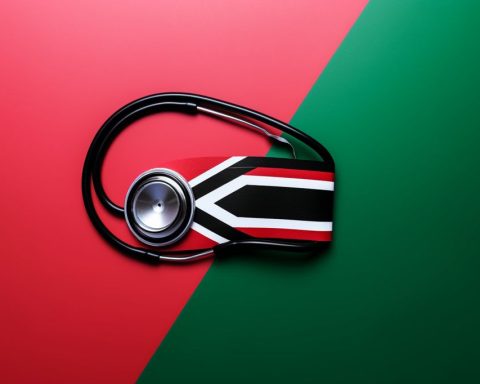The National Health Insurance Bill recently passed in South Africa marks a significant shift in healthcare, establishing the National Health Insurance Fund to provide universal health coverage and equal access to healthcare services for all citizens. The bill also includes protective measures to ensure efficient use of the fund’s resources. In addition to the healthcare reform, the National Council of Provinces also passed the Judicial Matters Amendment Bill and Regulation of Interception of Communication-Related Information Amendment Bill, impacting legal and communication privacy concerns in the country.
What Is the National Health Insurance Bill in South Africa?
The National Health Insurance Bill is a transformative shift in the healthcare scenario of South Africa. It establishes the National Health Insurance Fund, which aims to procure healthcare services for its registered users, assuring equal opportunity for all South Africans to healthcare services. Its objective is to bestow universal health coverage, implying that every South African citizen will be entitled to a broad spectrum of healthcare services without any expenses at healthcare facilities. The Bill also implements protective measures to ensure the equal, effective, and efficient use of the Fund’s resources.
On December 6, 2023, amidst the constant churn of legal deliberations, the National Council of Provinces (NCOP) in the Republic of South Africa made an influential leap in healthcare reform. The NCOP gave the green light to the National Health Insurance Bill, a monumental legislation that had received initial approval from the National Assembly earlier in the year on June 12.
Rather than being another bill navigating the complex governmental system, the National Health Insurance Bill symbolizes a transformative shift in the healthcare scenario of South Africa. A core aspect of this legislative tool is the formation of the National Health Insurance (NHI) Fund. The primary function of the Fund will be to procure healthcare services for its registered users, thereby assuring equal opportunity for all South Africans to healthcare services.
The Ambitions of the Bill
But the Bill’s aspiration isn’t confined to the establishment of the Fund. Its objective is to bestow universal health coverage, implying that every South African citizen will be entitled to a broad spectrum of healthcare services without any expenses at healthcare facilities like clinics, hospitals, and even offices of private health practitioners. These services are not just accessible, but free at the point of delivery. In this way, the Bill acts as a robust bulwark against monetary obstacles that frequently hinder healthcare access.
While ensuring access, the Bill is also cognizant of the prospects of misuse of such a fund. It implements protective measures to ensure the equal, effective, and efficient use of the Fund’s resources to meet the health requirements of the users. By doing this, the Bill anticipates and prevents any unfavorable, unethical, and unlawful practices that could surface concerning the Fund.
Legislative Activities Surrounding the Health Insurance Bill
The NCOP’s activities on the day were not limited to the National Health Insurance Bill. Two more significant bills were passed on the same day – the Judicial Matters Amendment Bill and the Regulation of Interception of Communication-Related Information Amendment (RICA) Bill.
The Judicial Matters Amendment Bill is an all-encompassing legislation that proposes to modify various acts managed by the Department of Justice and Constitutional Development. The modifications cover practical and technical issues, compliance with court judgments, alignment with technological advancements, enhanced reporting procedures, and assurance of effective administration of justice across different legal domains.
A noteworthy amendment in this Bill applies to the Criminal Procedure Act of 1977. It mandates the removal of criminal records of individuals who were fined for violating Covid-19 lockdown rules. Simultaneously, it amends the Magistrates’ Courts Act of 1944, outlining the protocol for a court to summon a witness, and the Administration of Estates Act of 1965, introducing provisions for electronic payments.
Legal Amendments Impacting Communication Privacy
Along the same lines, the RICA Bill endeavors to modify the Regulation of Interception of Communications and Provision of Communication-Related Information Act of 2002. The amendments arose after a Constitutional Court application by Amabhungane. In September 2022, the Court declared that the Act did not provide adequate protection to uphold the constitutional right to privacy, further bolstered by the rights of court access, freedom of expression, the media, and legal privilege.
The Court’s decision labeled the Act unconstitutional, emphasizing its failure to establish processes to lawfully manage data obtained through communication interception. The ruling highlighted the necessity for safeguards to prevent the illegal use or manipulation of such data. The Court set a deadline of February 4, 2024, to rectify this situation.
Upon receiving NCOP’s approval, the Judicial Matters Amendment Bill will be presented to the President for his consent. Simultaneously, the Regulation of Interception of Communications and Provision of Communication-Related Information Amendment Bill will be returned to the National Assembly for reviewing the proposed amendments by the NCOP.
In conclusion, the NCOP’s session on December 6, 2023, witnessed the adoption of three pivotal legislative bills, each with the potential to cause significant changes in the country’s health, legal, and communication landscapes.
What is the primary aim of the National Health Insurance Bill in South Africa?
The primary aim of the National Health Insurance Bill is to establish the National Health Insurance Fund, which will procure healthcare services for its registered users, assuring equal opportunity for all South Africans to healthcare services, and bestow universal health coverage.
Will healthcare services be free of cost under the National Health Insurance Bill?
Yes, every South African citizen will be entitled to a broad spectrum of healthcare services without any expenses at healthcare facilities like clinics, hospitals, and even offices of private health practitioners.
What is the Judicial Matters Amendment Bill?
The Judicial Matters Amendment Bill is a legislation that proposes to modify various acts managed by the Department of Justice and Constitutional Development and covers practical and technical issues, compliance with court judgments, alignment with technological advancements, enhanced reporting procedures, and assurance of effective administration of justice across different legal domains.
What is the Regulation of Interception of Communication-Related Information Amendment Bill?
The Regulation of Interception of Communication-Related Information Amendment Bill endeavors to modify the Regulation of Interception of Communications and Provision of Communication-Related Information Act of 2002 to enhance the protection of communication privacy and prevent the illegal use or manipulation of data obtained through communication interception.
What led to the amendments in the Regulation of Interception of Communication-Related Information Amendment Bill?
A Constitutional Court application by Amabhungane in September 2022 declared that the Act did not provide adequate protection to uphold the constitutional right to privacy, further bolstered by the rights of court access, freedom of expression, the media, and legal privilege.
What was the NCOP’s role in the legislative activities surrounding the Healthcare and Communication Privacy Bills?
The National Council of Provinces (NCOP) passed the National Health Insurance Bill, Judicial Matters Amendment Bill, and Regulation of Interception of Communication-Related Information Amendment Bill on the same day, impacting healthcare, legal, and communication privacy concerns in South Africa.












